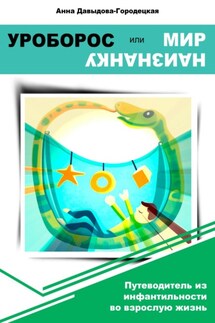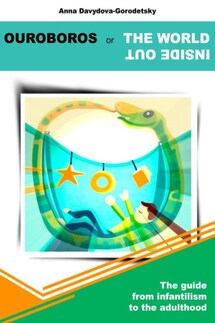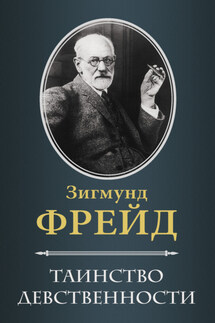Ouroboros or the world inside out - страница 14
This universal anguish permeates the entire existence of the ouroboric personality and is weakened only when there is a chance to realize the illusory dream, i.e., when a “dream embodiment” appears.
The one who will achieve a dream
In the ouroboric structure, there is no love or empathy, but there is idealization and a desire to possess a person who seems (it is an illusion) to the actor as someone who can help achieve what is desired. This desired thing varies from person to person – love, fame, power, money, status, stability, relationships, family, health, children, etc. These desirable things are the components that make up the Reference Image. Personally, I have always dreamed of stability and high social status.
By its own internal logic, often superficial and nonlinear, the ouroboric person decides that a particular person is the right one to make their individual desire from a dream become a reality. And “love” arises, or rather its ersatz – idealization. A substitution takes place: the actor thinks they feel love or sympathy, but this feeling is a burning desire to possess the object (another person) for personal and undivided use, as if this will lead to the realization of a dream. The “incarnate” is idealized and depersonalized; details cease to be important and are eliminated from the assessment of the possibility of building a connection with this person. The illusory perception of this “embodiment of desires” prevents realistic evaluation. Everything boils down to one thing only – to get it, or rather, to get what you want by using this person. This is called “love” or “attachment,” hence all the “I cannot live without you!” Such phrases should be understood literally as: “I need you urgently because I think that with your help, I can finally escape the hell of ouroboric inferiority and unite with my Reference Image!”
If the reader is patient, they will soon understand everything about both “ouroboric inferiority” and the “Reference Image.” Describing a rigidly looped structure, which has neither beginning nor end, is like watching the TV series “Santa Barbara” from the hundredth episode – it will be easier to understand what you are reading about now after reading the next chapter. So, all this ouroboric sudden attachment is nothing but infantile manipulation, hidden from everyone, including the actor themselves.
The actor does not consider the possibility of achieving what they want through independent action or partnership, nor do they objectively assess the situation to conclude that their desire might be unattainable. All efforts are aimed at obtaining the “incarnator” and then “squeezing” the realization of their dream out of them. When this does not happen, disappointment sets in, accompanied by a mass of claims and offenses, and the idealized idol is thrown off the pedestal. It is as if the contract for the realization of the dream has not been fulfilled, and penalties must be collected from the negligent performer. The counterparty does not understand anything, neither the sudden love or affection at the beginning, which they take at face value, nor the claims later.
So it turns out to be: “I'll use you to piggyback ride into paradise,” or “I'll use your hands to pull chestnuts out of the fire”, “You will help me reach my beau ideal, and I will idealize you, praise you, obey you, please you, and be what I think you want me to be”.







